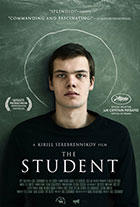
The Student (Uchenik) 2016, US 2017
Distributed by Passion River Films, 154 Mt. Bethel Rd., Warren, NJ 07059; 732-321-0711
Directed by Kirill Serebrennikov
DVD , color, 1h 58 min.
General Adult
Religious Fundamentalism, Christianity, Bible, Evolution, Satire, School Curriculums, Homohobia
Date Entered: 04/12/2018
Reviewed by Dmitrii Sidorov, California State University, Long BeachIn 2012 , German dramatist Marius von Mayenburg created a play, Martyr (Märtyrer), about rising religious fundamentalism in Germany. It was then transplanted to Russia, adopted and staged there by the country’s leading theater director Kirill Serebrennikov (who is famous for controversies such as the Bolshoi Theater’s cancellation of his Nureyev show and his current house arrest for alleged financial misdoings). The Student is another adaptation of that play, this time for the screen, by the same director and with many of his theater actors. As such, this film project arguably suffers from excessive theatricality a la Berthold Brecht. The Student is essentially a confrontational satire, a political pamphlet, a “dark parable”, psychologically and socially questionable, and presented primarily within constrained interior environments of two spaces—school and home.
Anyone trying to use this film as an illustration of ideological trends in contemporary Russia may appreciate its satirical visualization of the growing presence of the church in education yet be challenged by some of the film’s situations that seems to be out of place remaining more German than typically Russian. For example, the rebellious main character, high-schooler Veniamin (Petr Skvortsov), violates many basic school rules and harasses his classmates and teachers yet is supported by the school principal while his opponent, an instructor of evolutional biology, is expelled. Such a theatrical detachment from Russian realities may be one of the reasons why the film’s artistic freedoms and provocative statements were tolerated in a country where the majority of people support the Orthodox Church’s revival after decades of its harsh Communist oppression.
While the play is structured around the never-ending dispute of the high school student-turned-religious-dogmatist and his biology teacher who supports scientific atheism, the film itself, perhaps unintentionally, establishes a different binary opposition. The Christian neophyte Veniamin endlessly quotes the Bible and aggressively confronts his happy, confident, sportive young schoolmates who are often nominally Orthodox Christians yet in essence cherish different, pre-Christian pagan values as is evident in their worshipping of the sun (of the short and mild Russian summer), enjoying sexual freedoms (of the post-Communist time), and valuing attractiveness (everyone seems to be slender and good-looking in this ethnically homogeneous community) more than social propriety and complacency to ethical norms. Veniamin gains only one disciple, Grigory (Aleksandr Gorchilin), a crippled and characteristically unpopular boy. It is quite remarkable in this respect that the only exterior outdoor space in the film is a stone seafront (the film’s location is Kaliningrad, the most western exclave of Russia on the Baltic Sea) that in turn serves as a mostly nudist beach that seems to be frequented by the film’s main characters and other regular residents. That would certainly not be the case in the US.
Long before the current neo-conservative trends, American public culture, precipitated by the Protestant puritan norms, made public nudity a social taboo. American viewers of the film may be puzzled by the scene where the main character goes nude in his high-school classroom and receives relatively moderate reaction to his nudity by his classmates and teachers. It would be interesting to see how this scene is perceived in the politically correct American classroom where freedom of speech is increasingly confronted by self-censorship of visuals. The experience of screening and/or watching this film in the context of the present day US is arguably quite a different and new reincarnation of the original play and of the film. Their focus on religious zealotry is universally relevant and politically important today, yet the film’s educational insights may be in its trans-national and comparative regional contexts.
Awards